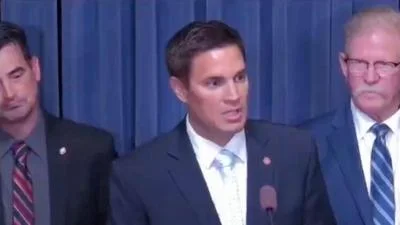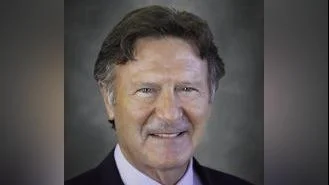State Rep. Darren Bailey (R-Xenia).
State Rep. Darren Bailey (R-Xenia).
In Illinois, we are three months into governance by Executive Order.
40 Executive Orders are already on the books since the beginning of the Coronavirus or COVID-19 outbreak.
One-person rule has a poor track record throughout history. Unfortunately, we’ve been living under a one-size-fits-all approach to the Coronavirus, and it’s led to economic, social and educational harm.
According to the Governor’s schedule, Illinois gets to move into Phase 4 of his reopening plans and permissions on June 26:
“Gatherings of 50 people or fewer are allowed, restaurants and bars reopen, travel resumes, child care and schools reopen under guidance from the Illinois Department of Public Health. Face coverings and social distancing are the norm.”
I got news for the Governor, even while we were under his Phase 3 plans (gatherings of 10 people or fewer are allowed), southern Illinois has been getting together in larger numbers, WITHOUT his permission.
We are frustrated. We don’t want a new normal. We want the old normal, and that should have happened at a much faster pace for downstate Illinois.
Our State Fairs in Springfield and DuQuoin are cancelled, as well as the Grand American World Trapshooting competition in Sparta.
I note these particular events because downstate Illinois never experienced the COVID-19 outbreak that impacted Chicago. We should have been farther along on the reopening process.
Wirepoints, an independent online resource for economic research and commentary about Illinois’ government, publishes numerous articles about the Coronavirus’ impact on our state.
In a recent story, Wirepoints claims downstate should have reopened weeks ago even using the Governor’s own data-driven metrics:
“Case positivity rates downstate have collapsed for nearly two straight months…Per capita hospital admissions have also been just a fraction of those in the Northeast region. And there was never the risk of running short of hospital resources downstate like there was in Chicago.”
The Wirepoints article includes a graph showing 90 percent of COVID-19 deaths occurred in northeast Illinois, the Chicago region.
The Governor’s failure to take regionalization into consideration is one of the biggest criticism of his decision-making.
People I talk to are skeptical of what they’re being told about the impact of the Coronavirus, and who can blame them. For example, a Chicago Sun-Times story about virus deaths in nursing homes in April, included an admission by the Governor’s spokesman that a “definitional error” resulted in “cases being counted twice.”
At one news conference, the Director of the Illinois Department of Public Health admitted that Illinoisans who died with the virus were counted as the same as those who died because of the virus:
“I just want to be clear in terms of the definition of people dying of COVID. The case definition is very simplistic. It means, at the time of death it was a COVID positive diagnosis, so that means that if you were in hospice and had already been given a few weeks to live and then you were also found to have COVID that would be counted as a COVID death.
It means that if technically even if you died of clear alternate cause, but you had COVID at the same time, it's still listed as a COVID death. Everyone who is listed as a COVID death, doesn't mean that was the cause of the death, but they had COVID at the time of death,” Dr. Ngozi Ezike said.
There are other concerns too.
Rules for Illinois daycare facilities under the governor's lockdown Executive Orders were delayed for weeks before any set of guidelines were released. The delay caused a lot of economic pain for these businesses, and I fear that some may not be coming back, unable to survive the lockdown orders.
Our schools have only now (as of June 23) received information about reopening.
Will our teachers and administrators have a chance to provide input moving forward? Again, can a one-size- fits-all and top-down approach work for both Louisville and Chicago? What if the schools determine the guidelines to be impractical and unworkable; what happens next? The Governor previously talked about a combination of in-school and remote learning, but many students won’t get the same level of instruction and guidance if they are out of the classroom.
The lockdown orders have also had a devastating impact on the state economy. Sadly, there will be businesses that will never come back.
A recent academic study indicates 100,000 businesses across the country permanently collapsed because of the Coronavirus pandemic. That conclusion was reached more than a month ago. The University of Illinois participated in the research. Here’s an important quote:
“A team of researchers at the University of Illinois, Harvard University, Harvard Business School and University of Chicago discovered at least 2 percent of the nation’s small businesses are now gone after conducting a representative survey of more than 5,800 enterprises between May 9-11.”
The University of Illinois at Chicago School of Public Health released a related report on June 1 about the immediate and lasting impact of the Coronavirus on the state economy. The report predicts a loss of more than 550,000 jobs by March of 2021:
“The report says it is likely that somewhere between 1 million and 1.5 million Illinois jobs may be affected overall.”
One person rule doesn’t work fairly and equitably anywhere it’s tried, and neither does one party rule. One party rule of Illinois contributed mightily to the current fiscal failure of state government. The state’s public debt is beyond the ability of us mere mortal taxpayers to pay off, yet the most recent budget passed by the majority spends more than ever before in a single year: $43 billion ($43,000,000,000)!
These same people passed two major state income tax increases with promises of better times. It never happened. Instead, they are constantly looking to raise taxes, and are proposing to radically change the way state income taxes are imposed – all designed to siphon more money out of the pockets of hardworking Illinoisans.
It’s long past time for “all hands on deck.” Leadership is about bringing people together, marshalling the forces to meet challenges head on, clearly mapping out a plan and then executing it, but always remaining flexible to adjust and alter it as you move forward. Illinoisans need confidence in its government and a Governor and the Legislature working together rather than one person’s one-size-fits-all approach, which is a one-size-disservice to all.
– State Rep. Darren Bailey (R-Xenia) represents the 109th District, which includes all of Edwards, Jasper, Richland, Wabash, Wayne and White counties as well as parts of Effingham and Lawrence counties.






 Alerts Sign-up
Alerts Sign-up